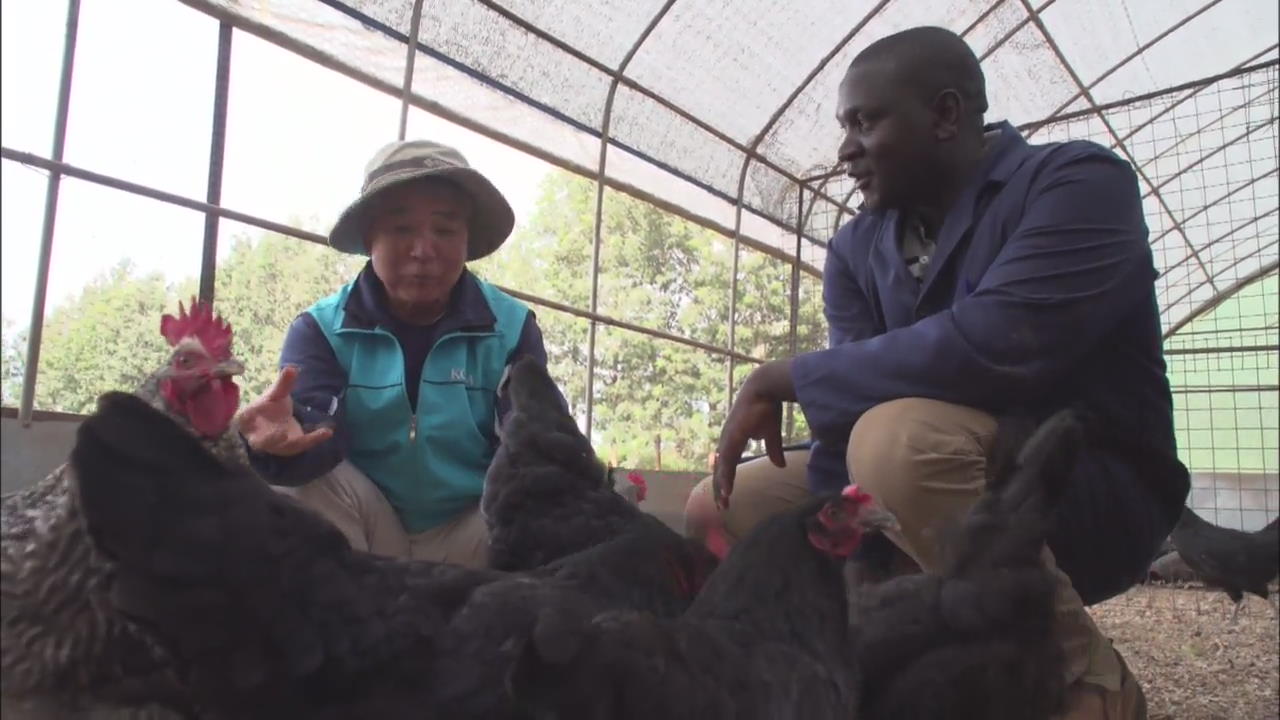Korean Farming Know-How
입력 2017.05.19 (14:10)
수정 2017.05.19 (14:17)
읽어주기 기능은 크롬기반의
브라우저에서만 사용하실 수 있습니다.
[Anchor Lead]
Projects to distribute advanced Korean farming techniques to countries in Africa are reaping impressive results. Thanks to the new farming know-how, Kenyan farmers enjoy three times as much income as before.
[Pkg]
This is a rural community in Nairobi, Kenya. Its residents gather to learn how to manage a poultry farm. One hundred farms received Korean indigenous chickens through the support of Korea's Rural Development Administration. In just one year after the chicken distribution, the local egg output increased five-fold.
[Soundbite] Anastasia Bata(Chicken Farmer)
The story was much the same for this village, which had received quality seed potatoes with a high resistance to viruses. The village's potato output grew nearly four times compared to yields before the introduction of Korean farming methods. It's only been a year since Korean farming techniques were taught in Kenya, yet the villages' farm incomes have tripled.
[Soundbite] Kim Choong-hoi(Director, KOPIA Kenya) : "Kenyan farmers' incomes are low. In order to raise their incomes, we supported a program that taught villagers to cultivate and distribute good seeds within their own community."
The Rural Development Administration further plans to build chick hatcheries or irrigation systems in the villages.
Projects to distribute advanced Korean farming techniques to countries in Africa are reaping impressive results. Thanks to the new farming know-how, Kenyan farmers enjoy three times as much income as before.
[Pkg]
This is a rural community in Nairobi, Kenya. Its residents gather to learn how to manage a poultry farm. One hundred farms received Korean indigenous chickens through the support of Korea's Rural Development Administration. In just one year after the chicken distribution, the local egg output increased five-fold.
[Soundbite] Anastasia Bata(Chicken Farmer)
The story was much the same for this village, which had received quality seed potatoes with a high resistance to viruses. The village's potato output grew nearly four times compared to yields before the introduction of Korean farming methods. It's only been a year since Korean farming techniques were taught in Kenya, yet the villages' farm incomes have tripled.
[Soundbite] Kim Choong-hoi(Director, KOPIA Kenya) : "Kenyan farmers' incomes are low. In order to raise their incomes, we supported a program that taught villagers to cultivate and distribute good seeds within their own community."
The Rural Development Administration further plans to build chick hatcheries or irrigation systems in the villages.
■ 제보하기
▷ 카카오톡 : 'KBS제보' 검색, 채널 추가
▷ 전화 : 02-781-1234, 4444
▷ 이메일 : kbs1234@kbs.co.kr
▷ 유튜브, 네이버, 카카오에서도 KBS뉴스를 구독해주세요!
- Korean Farming Know-How
-
- 입력 2017-05-19 14:04:35
- 수정2017-05-19 14:17:10

[Anchor Lead]
Projects to distribute advanced Korean farming techniques to countries in Africa are reaping impressive results. Thanks to the new farming know-how, Kenyan farmers enjoy three times as much income as before.
[Pkg]
This is a rural community in Nairobi, Kenya. Its residents gather to learn how to manage a poultry farm. One hundred farms received Korean indigenous chickens through the support of Korea's Rural Development Administration. In just one year after the chicken distribution, the local egg output increased five-fold.
[Soundbite] Anastasia Bata(Chicken Farmer)
The story was much the same for this village, which had received quality seed potatoes with a high resistance to viruses. The village's potato output grew nearly four times compared to yields before the introduction of Korean farming methods. It's only been a year since Korean farming techniques were taught in Kenya, yet the villages' farm incomes have tripled.
[Soundbite] Kim Choong-hoi(Director, KOPIA Kenya) : "Kenyan farmers' incomes are low. In order to raise their incomes, we supported a program that taught villagers to cultivate and distribute good seeds within their own community."
The Rural Development Administration further plans to build chick hatcheries or irrigation systems in the villages.
Projects to distribute advanced Korean farming techniques to countries in Africa are reaping impressive results. Thanks to the new farming know-how, Kenyan farmers enjoy three times as much income as before.
[Pkg]
This is a rural community in Nairobi, Kenya. Its residents gather to learn how to manage a poultry farm. One hundred farms received Korean indigenous chickens through the support of Korea's Rural Development Administration. In just one year after the chicken distribution, the local egg output increased five-fold.
[Soundbite] Anastasia Bata(Chicken Farmer)
The story was much the same for this village, which had received quality seed potatoes with a high resistance to viruses. The village's potato output grew nearly four times compared to yields before the introduction of Korean farming methods. It's only been a year since Korean farming techniques were taught in Kenya, yet the villages' farm incomes have tripled.
[Soundbite] Kim Choong-hoi(Director, KOPIA Kenya) : "Kenyan farmers' incomes are low. In order to raise their incomes, we supported a program that taught villagers to cultivate and distribute good seeds within their own community."
The Rural Development Administration further plans to build chick hatcheries or irrigation systems in the villages.
이 기사가 좋으셨다면
-
좋아요
0
-
응원해요
0
-
후속 원해요
0

















이 기사에 대한 의견을 남겨주세요.